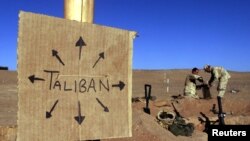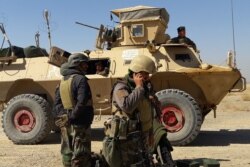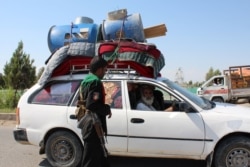The Taliban have ruled out progress in otherwise stalled peace negotiations with their adversaries in Afghanistan unless, they say, their leaders are removed from U.S. and U.N. sanctions lists.
The hardened Taliban stance toward a political settlement to the deadly Afghan conflict comes amid intensified insurgent battlefield attacks, since the United States and NATO began pulling their last remaining troops from the country on May 1.
In a commentary published on their official website, the Taliban described the sanctions as an obstacle in the negotiation process, saying that "so long as such lists exist" it would be "unreasonable" for the United Nations and other countries to expect intra-Afghan peace talks to successfully deliver a political settlement.
"It is imperative for mutual trust that names of individuals associated with the Islamic Emirate (Taliban) be completely, and not conditionally or temporarily, be removed from black and reward lists," the Taliban said.
The international sanctions were imposed in 1999, when the Taliban were in power in Kabul and had enforced harsh Islamic laws in Afghanistan.
The punitive U.N. measures were expanded and U.S. subsequently also placed bounties on Taliban leaders after the September 11, 2001, terrorist attacks on the United States, which Washington said al-Qaida leaders plotted from sanctuaries in Taliban-ruled Afghanistan.
Scores of top insurgent leaders were placed on the U.N. Security Council's blacklist that imposes travel bans and asset freezes.
Continued fighting
Violence continues in Afghanistan, as U.S.-coalition forces pull out of the country.
American warplanes reportedly backed Afghan forces in battling a major Taliban offensive in the southern Helmand province. The U.S. military continues "to deliver precision air strikes in support" of Afghan forces in Helmand and other regions of the country, a provincial official told AFP.
The fighting has inflicted casualties on both sides and forced thousands of people to flee to safety, say residents in the province.
On Wednesday, officials said the Taliban captured the district of Barka in northern Baghlan province, made territorial advances in other areas and killed a district police chief, among others, in southeastern Paktika province.
Foreign military withdrawal
The foreign military drawdown, which is supposed to be concluded by September 11, stems from a February 2020 agreement the United States signed with the Taliban to wind down what has been America's longest war.
In return, the Taliban ceased attacks on U.S. and NATO forces and pledged to fight terrorism as well as negotiate a political settlement with Afghan rivals that would end the country's long conflict.
The deal had required all foreign troops to leave Afghanistan by May 1, but U.S. President Joe Biden missed the deadline, citing logistical reasons.
However, peace talks between the Afghan government and the Taliban, which started in Qatar last September after the signing of the U.S.-Taliban deal, have mostly been deadlocked.
The Taliban denounced Washington for missing the troop withdrawal deadline and has refused to attend any peace-related meetings until all international forces leave the country.
The insurgents have also called for the release of around 7,000 Taliban prisoners from Afghan jails, saying Washington pledged to deliver on those commitments at the signing of the pact.
A senior U.S. State Department official confirmed on Tuesday during a background briefing that the Taliban repeatedly raised the prisoners' release and delisting of their leaders in talks with American interlocutors.
"The message that they have gotten back from us is that those things are nice, but our agreement with them also talked about a reduction in violence. It talked about a genuine negotiations toward a political settlement, and it also has some counterterrorism requirements that are not entirely met," said the U.S. official who spoke on condition of anonymity.
"Our message to the Taliban is that they need to get back to the negotiating table," the official added. "There may be a package of steps eventually that gets talked about as to exactly how to orchestrate that and specially how to make the process successful."
Critics of Biden's decision to withdraw say the Taliban will try to sweep back into power. The insurgents control or contest nearly half of Afghan territory.







